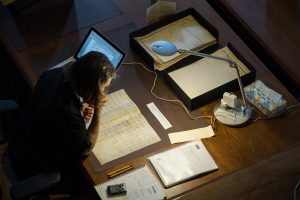After visiting the Clements Library, one of our fellows had this to say about the experience:
“The Clements Library not only has an amazing variety of rich collections but also an incredibly helpful, professional staff. During the approximately two and a half months I spent as a Fellow at the William L. Clements Library, I was able to make significant progress on my book manuscript. I made extensive use of the library’s rich collections of manuscripts, rare books, maps, and graphic materials. Over the course of ten weeks I was able to review approximately forty individual and manuscript collections, fifty-five rare books, peruse the entire map collection related to the western portion of what would became the United States, and explore a great variety of graphic materials, ranging from family photo albums to railroad and auto tourist brochures.”
Scholars from across the globe visit us to work on books, articles, dissertations, creative projects, and more. To help encourage use of our rich historical sources on early America, the Library offers a number of fellowships, both long-term and short-term, available to graduate students, junior and senior faculty, and independent researchers traveling 200 miles or more. In 2018 we welcomed 15 fellows. Fellows are encouraged to present a brown bag talk or write a guest blog post related to their research.
 Visit our website for more information and instructions on how to apply as well as to view a list of previous fellows and their projects. If appropriate, please consider posting fliers advertising these fellowships to interested researchers. For questions, please email [email protected].
Visit our website for more information and instructions on how to apply as well as to view a list of previous fellows and their projects. If appropriate, please consider posting fliers advertising these fellowships to interested researchers. For questions, please email [email protected].
Fellowship for Diversity, Equity, and Inclusion in American History supports research at the Clements Library by graduate students or junior faculty from Historically Black Colleges and Universities who are undertaking a research project that examines topics of diversity, equity, and inclusion or who demonstrate a commitment to diversity in the field of American History. The award will be based largely on the significance of the Clements’ collection to the applicant’s research. Grants are for $1,000 and require a minimum visit of one week.
*NEW* Brian Leigh Dunnigan Fellowship in the History of Cartography is funded through donations honoring 22 years of service at the Clements Library by Brian Dunnigan, who served as Map Curator and Associate Director. During his tenure, Brian oversaw the fellowship program and mentored many fellows during their stay in Ann Arbor. The fellowship supports research utilizing the Clements Library’s cartographic collections. Grants are for $1,000 and require a minimum visit of one week.
Earhart Fellowship on American History was originally funded through a grant from the Earhart Foundation and now through an estate gift by Vera Wolfe. The Earhart fellowship provides $10,000 for scholarly research on any aspect of American history prior to 1901. Successful applicants are expected to spend a minimum of two months at the Clements. This is a post-doctoral fellowship that requires a completed Ph.D. or equivalent qualifications at the time of application.
*NEW* Richard and Mary Jo Marsh Fellowship has been provided by Clements Library Associate Board of Directors member Dick Marsh and his wife Mary Jo to fund any project supported by the Clements collections. Grants are for $1,000 and require a minimum visit of one week.
Howard H. Peckham Fellowships on Revolutionary America is a post-doctoral fellowship requiring a completed Ph.D. or equivalent qualifications at time of application. Longtime Clements Library Associates Board of Governors member Bill Earle created the fellowship for three reasons. 1) To honor the second director of the Clements Library, Howard Peckham 2) To memorialize his parents, George and Ruth Earle, who knew and supported Howard Peckham and 3) To provide funding for research projects studying early America from the Revolutionary War to the War of 1812 (1764-1815). Bill encourages other donors to contribute to the Peckham Fund to help provide even more fellowships.
The long-term Peckham fellowship requires a residence of two months or more with an award of $10,000 and *NEW* this year is the option to apply for a short-term fellowship which requires a residence of one week or more and provides an award of $1,000.
Jacob M. Price Visiting Research Fellowships were established to honor Professor Jack Price after his retirement as a distinguished member of the history faculty at the University of Michigan. Since 1995, over 200 early-career historians have received Price Fellowships, with many going on to splendid careers of their own, such as 1997 Price Fellow Dr. Elizabeth Fenn, who recently won the Pulitzer Prize. Graduate students and junior faculty may apply with projects on any topic of American history that is supported by the collections. Grants are for $1,000 and require a minimum visit of one week.
Reese Fellowship in the Print Culture of the Americas, funded by the William Reese Company, encourages research in the history of the book and other print formats, bibliography, and other aspects of print culture in America, including publishing and marketing, from the sixteenth century to 1900. The Reese Fellowship provides $5,000 to support one month of in-residence study in the Clements Library collections. This is a post-doctoral fellowship requiring a completed Ph.D. or equivalent qualifications at time of application.
*NEW* Mary G. Stange Fellowship, funded by the Mary G. Stange Charitable Trust, offers $1,000 to support research on any topic of American history supported by the collections for a minimum visit of one week. Unique projects are encouraged.
Norton Strange Townshend Fellowship, established by the Avenir Foundation, offers $10,000 in support of scholarly research on diversity, equity and inclusion in American history during the nineteenth century. Successful applicants are expected to spend a minimum of two months at the Clements. This is a post-doctoral fellowship that requires a completed Ph.D. or equivalent qualifications at the time of application.

